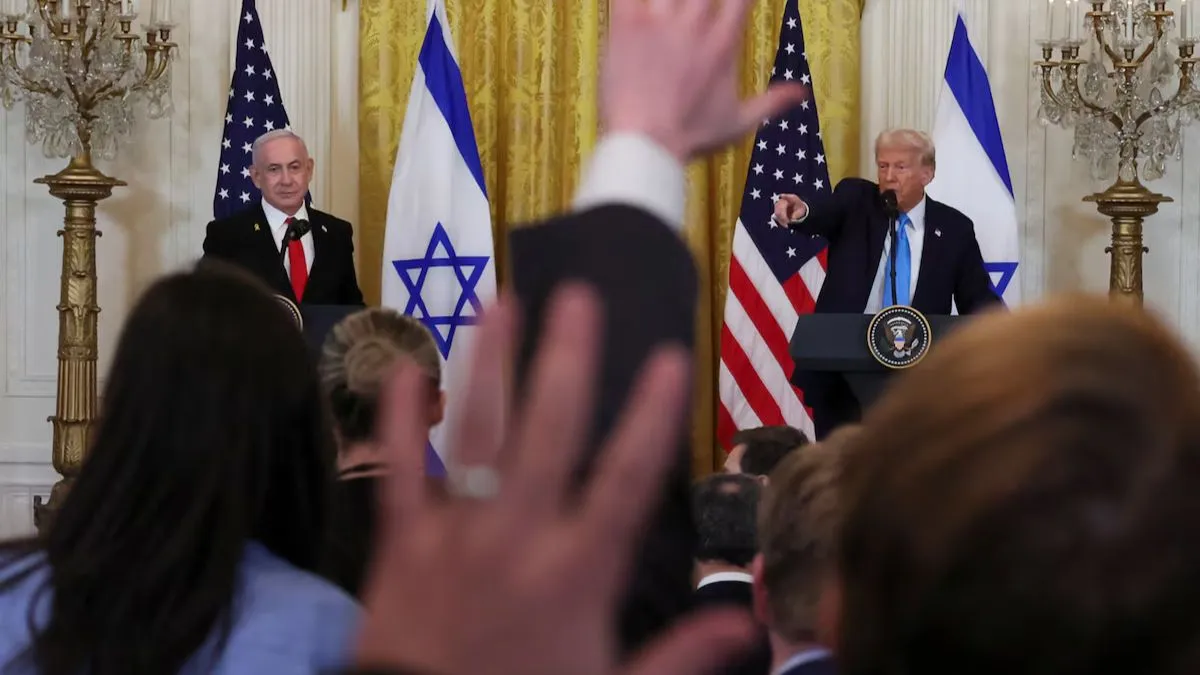- By Ajeet Kumar
- Fri, 20 Jun 2025 07:07 PM (IST)
- Source:JND
Roughly one month ago, from the stage at an investment forum in Saudi Arabia, US President Donald Trump issued a warning to Iran that would prove prophetic. "We'll never allow America and its allies to be threatened with terrorism or nuclear attack," Trump told the crowd, sending a message to the leadership in Tehran.
"The time is right now for them to choose. Right now. We don't have a lot of time to wait. Things are happening at a very fast pace." That May 13 ultimatum received little attention at the time. But behind the scenes, the president already knew an attack on Iran could be imminent, and that there might be little he could do to stop it, according to two US officials.
By mid-May, the Pentagon had begun drawing up detailed contingency plans to aid Israel if it followed through on its long-held ambition to strike Iran's nuclear program, the officials said. And, the US had already diverted thousands of defensive weapons away from war-torn Ukraine toward the Middle East in preparation for potential conflict, Reuters reported citing a Western source familiar with the matter and a Ukrainian source.
While Trump has long described himself as a peacemaker, dispatching Middle East envoy Steve Witkoff to the region several times to try to seal a diplomatic accord, he had several trusted political allies pushing him to back an Israeli attack on Iran's nuclear facilities.
What forced Netanyahu to take sudden action on Iran
And US intelligence had indicated a unilateral Israeli strike was possible, even likely, even if Trump wanted to wait, according to two US officials. While it is unclear if Israeli Prime Minister Benjamin Netanyahu or Trump's more hawkish allies ever got him to a "yes" to Israel's plans, by the days leading up the strike he was at least not a "no," two senior US officials and a senior Israeli source told news agency Reuters. That stance, people familiar with the dynamics said, helped tip Israel into action. Seven days into the Israel-Iran conflict, Trump is left with a dilemma, said Aaron David Miller, a veteran diplomat who has advised six secretaries of state on Middle East policy.
He can try again to pursue a diplomatic resolution with Iran, allow Iran and Israel "to fight it out," or he can enter the war with US airstrikes on the deeply buried Fordow enrichment plant, a step that would have unknown consequences for the region.
Trump "let it (the Israeli attack) happen," said Miller, a senior fellow at the Carnegie Endowment for International Peace policy institute. "He got on the tiger and he's riding it." The White House on Thursday said that Trump will make a decision on whether the US will get involved in the conflict in the next two weeks.The White House, the Israeli prime minister's office and Iran's delegation to the United Nations did not respond to a request for comment. Tehran has consistently said its nuclear program is designed for peaceful purposes only, a conclusion Washington has rejected.
The coming storm
One of the first hints that Trump might sign off on an Israeli bombing campaign came in April. During a closed-door meeting on April 17, Saudi Arabia's defence minister delivered a blunt message to Iranian President Masoud Pezeshkian: Take Trump's offer to negotiate an agreement seriously because it presents a way to avoid the risk of war with Israel.
The Israel Defence Forces and the head of US Central Command, General Michael "Erik" Kurilla, were discussing detailed intelligence about Iran's missile buildup and nuclear program and steps that could be required to defend US troops and Israel itself in any conflict with Iran, according to a US official and senior Israeli official. Meanwhile, the US was funneling weapons to Israel that would be useful for an air war with Iran. In one instance in early May, a large shipment of defensive missiles originally meant for Ukraine was diverted to Israel instead, Reuters cited Western source and the Ukrainian source.
The diverted shipment caused consternation in Kyiv and sparked continued fears that additional weapons needed to defend against Moscow will instead be used to defend US interests elsewhere, the Ukrainian source told Reuters.
In the opening months of Trump's term, Israel had already proposed to Washington a series of options to attack Iran's facilities.
ALSO READ: US: Arkansas Girl Mauled To Death While Attempting To Feed 30 To 40 Neglected Dogs
While Trump had rebuffed those ideas, saying he preferred diplomacy for the time being, several people close to him said he was never dead-set against using military force against Iran. He had done so before. In 2020, despite a foreign policy during his first term that was otherwise marked by restraint, Trump ordered a drone strike that killed Major General Qassem Soleimani, the head of the Iranian Revolutionary Guards' division responsible for its international operations.
Iranian plot to murder Trump
The Iranian government has since sought to murder Trump in revenge, US prosecutors have said, an allegation Tehran denies. Behind the scenes, Trump had been pulled in multiple directions on the Iran issue since before he even took office. On one side, many supporters - including conservative media personality Tucker Carlson - and administration officials saw Trump's Make America Great Again movement as an antidote to decades of foreign wars that cost thousands of American lives without significantly advancing American interests.
On the other, several close Trump allies - from conservative commentator Mark Levin to Republican Senator Lindsey Graham - were portraying a nuclear Iran as an existential threat that must be removed at any cost.
Trump himself took pride in being a broker of peace. "My proudest legacy," he said during his inauguration address, "will be that of a peacemaker and unifier." However, his social media posts, said otherwise.
As of Friday, his intentions were still unclear.
(With inputs from agency)


